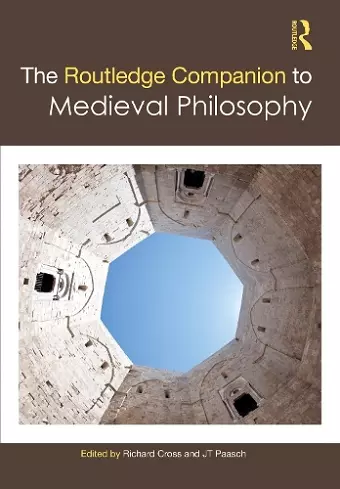The Routledge Companion to Medieval Philosophy
Richard Cross editor JT Paasch editor
Format:Paperback
Publisher:Taylor & Francis Ltd
Published:9th Jan '23
Currently unavailable, and unfortunately no date known when it will be back
This paperback is available in another edition too:
- Hardback£220.00(9780415658270)

Like any other group of philosophers, scholastic thinkers from the Middle Ages disagreed about even the most fundamental of concepts. With their characteristic style of rigorous semantic and logical analysis, they produced a wide variety of diverse theories about a huge number of topics.
The Routledge Companion to Medieval Philosophy offers readers an outstanding survey of many of these diverse theories, on a wide array of subjects. Its 35 chapters, all written exclusively for this Companion by leading international scholars, are organized into seven parts:
I Language and Logic
II Metaphysics
III Cosmology and Physics
IV Psychology
V Cognition
VI Ethics and Moral Philosophy
VII Political Philosophy
In addition to shedding new light on the most well-known philosophical debates and problems of the medieval era, the Companion brings to the fore topics that may not traditionally be associated with scholastic philosophy, but were in fact a veritable part of the tradition. These include chapters covering scholastic theories about propositions, atomism, consciousness, and democracy and representation.
The Routledge Companion to Medieval Philosophy is a helpful, comprehensive introduction to the field for undergraduate students and other newcomers as well as a unique and valuable resource for researchers in all areas of philosophy.
"This is an excellent collection of up-to-the-minute discussions of medieval philosophy, organized thematically, by some of the very best scholars working in the field today. Accessible to non-specialists, it provides overviews of key areas in a manner that is rewarding to beginners and experts alike."
Peter King, University of Toronto, Canada
"The riches of medieval philosophy and its relevance to the contemporary philosophical reader have long been clear, but there are constantly new discoveries in the field. This book gathers together many of these discoveries by offering comprehensive treatment of the scholastic tradition in Latin Christendom. With a roster of expert authors including both younger and more established scholars, the volume provides insightful and nuanced discussions of a huge number of philosophical themes and will be of use to the general and more advanced reader."
Peter Adamson, Ludwig-Maximilians Universität, Germany, and King’s College London, UK
"This is an excellent collection of up-to-the-minute discussions of medieval philosophy, organized thematically, by some of the very best scholars working in the field today. Accessible to non-specialists, it provides overviews of key areas in a manner that is rewarding to beginners and experts alike."
Peter King, University of Toronto, Canada
"The riches of medieval philosophy and its relevance to the contemporary philosophical reader have long been clear, but there are constantly new discoveries in the field. This book gathers together many of these discoveries by offering comprehensive treatment of the scholastic tradition in Latin Christendom. With a roster of expert authors including both younger and more established scholars, the volume provides insightful and nuanced discussions of a huge number of philosophical themes and will be of use to the general and more advanced reader."
Peter Adamson, Ludwig-Maximilians Universität, Germany, and King’s College London, UK
"This is an excellent volume. Focused mainly on Latin scholasticism, the 31 essays are organized topically rather than historically and they are uniformly informative and well written. . . . The book is full of fascinating discussions of major topics too numerous to include here. In particular, Paasch's contribution on medieval logic games gave this reviewer much to think about as both a scholar and a teacher, and he found himself wondering how he could incorporate these games in undergraduate logic classes. All in all, this book stands out as an excellent source for those studying Latin scholasticism. Summing Up: Highly recommended. Lower- and upper-division undergraduates; graduate students."
B. T. Hardingin CHOICE
ISBN: 9780367562830
Dimensions: unknown
Weight: 739g
424 pages